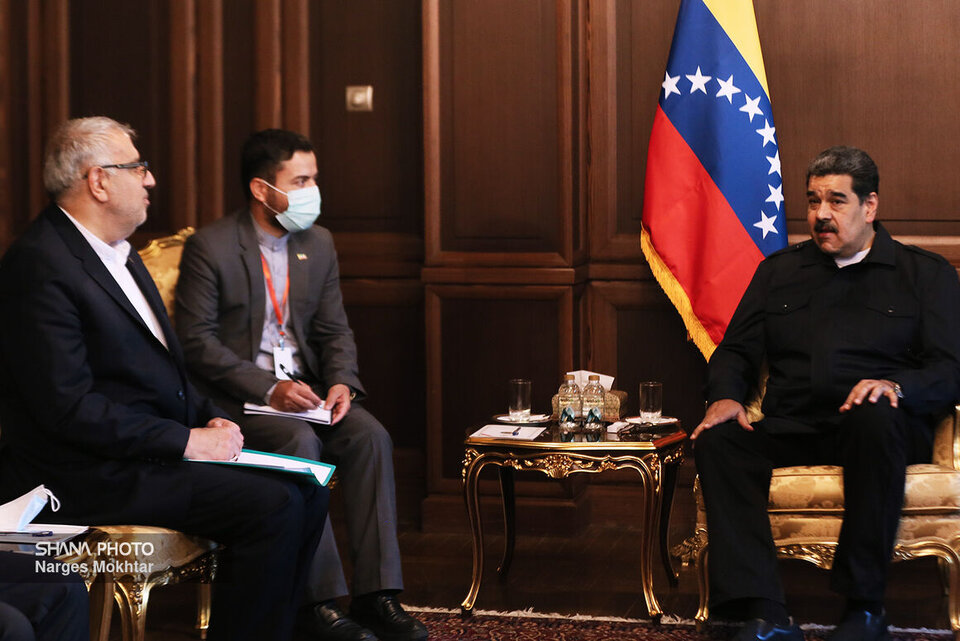Iran with 157 billion barrels of crude oil and Venezuela with 303.8 billion barrels of crude oil in their reserves, according to the latest report of the Organization of the Petroleum Exporting Countries (OPEC), currently produce 2. 564 million barrels and 707,000 barrels of oil per day, respectively; a production capacity that can grow much more given their potentialities. By removal of the sanctions, the two countries can bring down the price of oil which has hit $120 per barrel. But will the US opt for $5 a gallon of gasoline or lift sanctions on Iran and Venezuela with more than 460 billion barrels of crude reserves?
Tehran and Caracas, however, are expanding relations in various sectors, including energy, which has been smoothed during the visit of Iranian Minister of Petroleum Javad Owji to Venezuela in May.
Iranian Gasoline in Venezuela
In May of this year, Owji headed a delegation to Latin American countries. The cooperation between Iran and Venezuela, which had already begun with the start of Iranian gasoline exports to this country in 2020, was on a new path and expanded to other sectors.
In June 2016, five tankers, namely Clover, Forrest, Petunia, Fortune and Foxon, carrying 1,530,000 barrels of Iranian gasoline and petroleum products, were sent to Venezuela and entered the country's ports from May 25 to June 1 of the same year. "I have a duty to travel to Iran personally to thank these people," Venezuelan President Nicolas Maduro said as his fifth tanker arrived in Venezuela. "Venezuela and Iran both want peace and we have the right to trade freely," Maduro told Venezuelan state media.
Russia Today (RT) also published a report in those days: After Iran sent gasoline to Venezuela, the Spanish hashtag #GraciasIran (meaning thank you Iran) became a Twitter trend and Iran was praised for its cooperation against the US naval blockade.
Tehran, Caracas Ties in a new direction
Iran-Venezuela cooperation has not ended with the export of petroleum products. On January 11, the two countries signed a memorandum of understanding on the sidelines of the 6th Summit of the Gas Exporting Countries Forum (GECF) in Doha, Qatar, in the presence of President Ebrahim Raisi in the field of technical services, technology transfer, training services, manpower training and cooperation in the refining sector. The document was signed by the Iranian Minister of Petroelum and Venezuelan Foreign Minister Felix Plasencia Gonzalez.
During Owji's visit to Latin America in May, in addition to pursuing these issues, emphasis was placed on cooperation in the petrochemical sector and the use of Venezuela's refining capacity, and the Minister of Petroleum said: “The first phase of the 100,000-barrel Nicaraguan oil refinery will be completed with the investment of Venezuela, despite US sanctions, and with the delivery of the technical documentation for this project, Iran will undoubtedly participate in the completion of this project and other refining projects.”
"Effective cooperation with Latin American countries has provided tremendous opportunities for our oil industry and national economy, and for the first time," Owji said at the 26th Iran International Exhibition of Oil, Gas, Refining and Petrochemicals. “For the first time in decades, the dream of oil industry experts to acquire foreign refineries through active energy diplomacy has been realized and new and attractive markets for Iranian oil, condensate and petroleum products have been achieved, in which we have achieved great success, which shows the concern of the Ministry of Petroleum in tapping all the existing capacities in the world."
Worn-out Venezuelan Refining Industry and Cooperation with Iran
Refinery development and updating is one of the areas of cooperation between Iran and Venezuela. Venezuela's refining sector is suffering from chronic wear and tear due to sanctions imposed on the country, and the country's domestic companies lack the capability to upgrade refineries themselves. In 2020, the nameplate refining capacity of the country was 1.3 million barrels per day, but the its refining production was only 123,000 barrels per day. By upgrading its refineries, Iran can refine some of its crude oil in Venezuelan refineries and sell it in the Latin American market, because its production is less than its refining capacity.
Venezuelan Oil Economy
The 916,000-square-kilometer Bolivarian Republic of Venezuela is located in a large triangle in the north of South America and has an important strategic position due to its barrier between Latin America and Central America and its rich natural resources. It is bordered by Colombia to the west, Guyana to the east, Brazil to the south, and the Atlantic and Caribbean Seas to the north. The country has a population of 28 million.
The economy is based on oil and gas, and in 2021 the country's total nominal GDP was $73 billion, an increase of about $23 billion compared to 2020. In 2021, the real GDP growth of this country was 0.7 percent, while from 2014 to 2020, the real GDP growth of this country was negative.


Your Comment